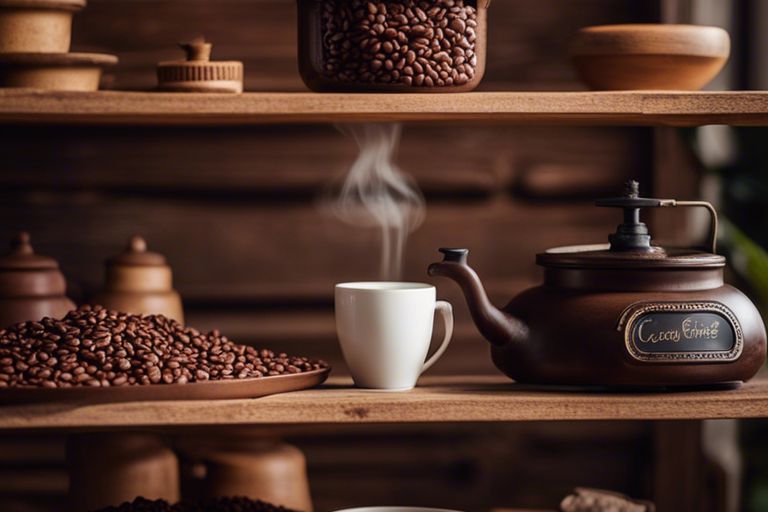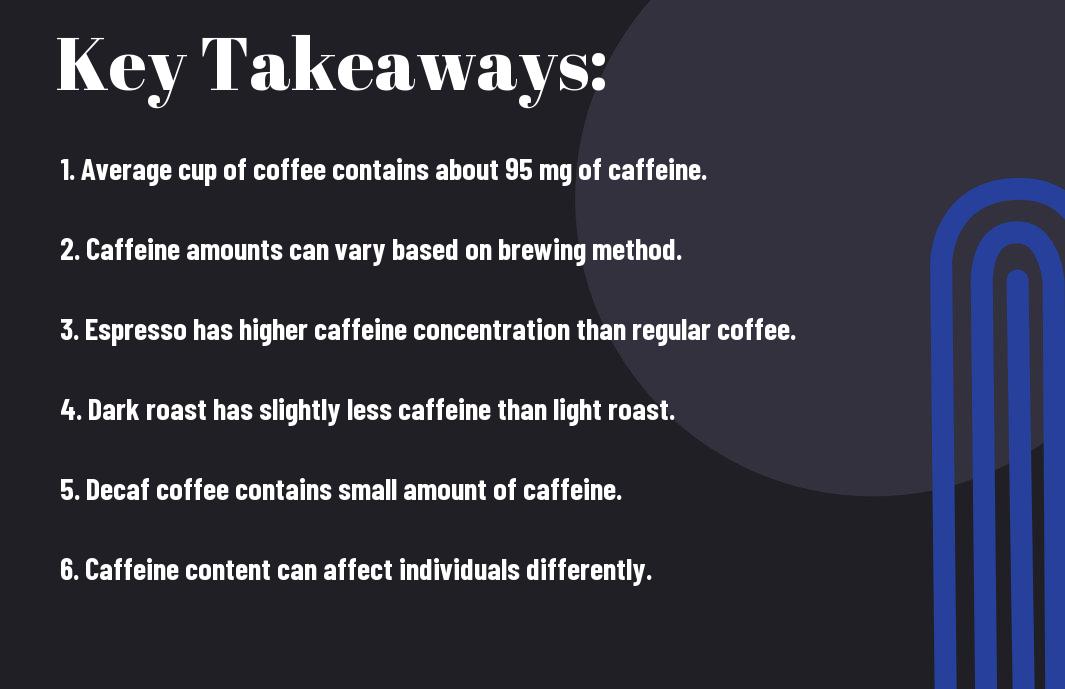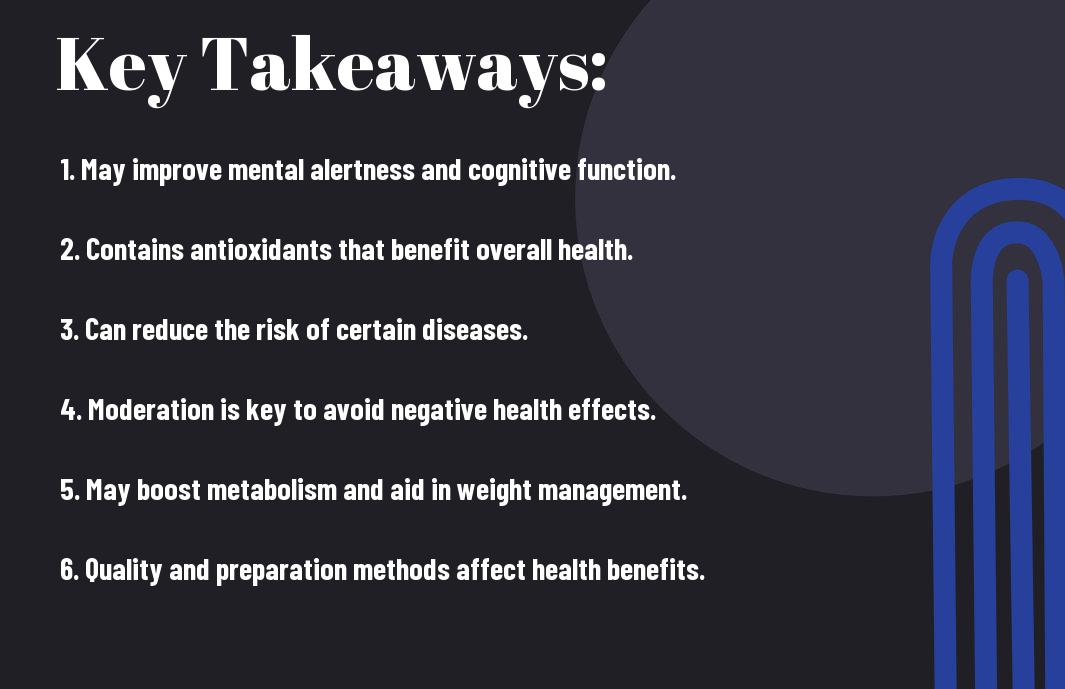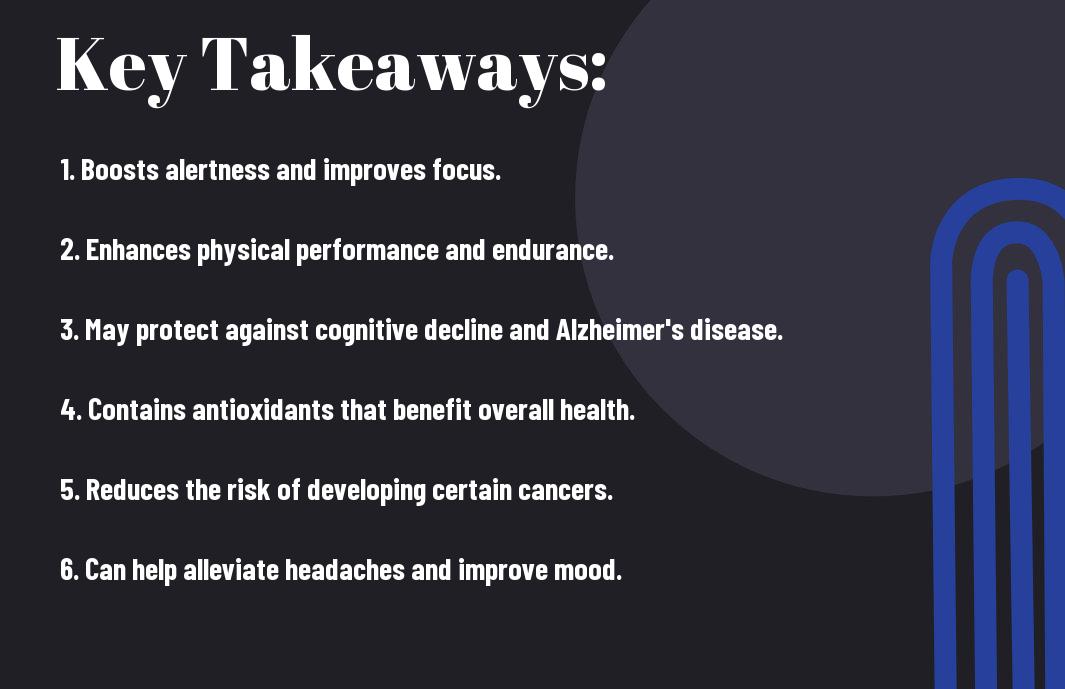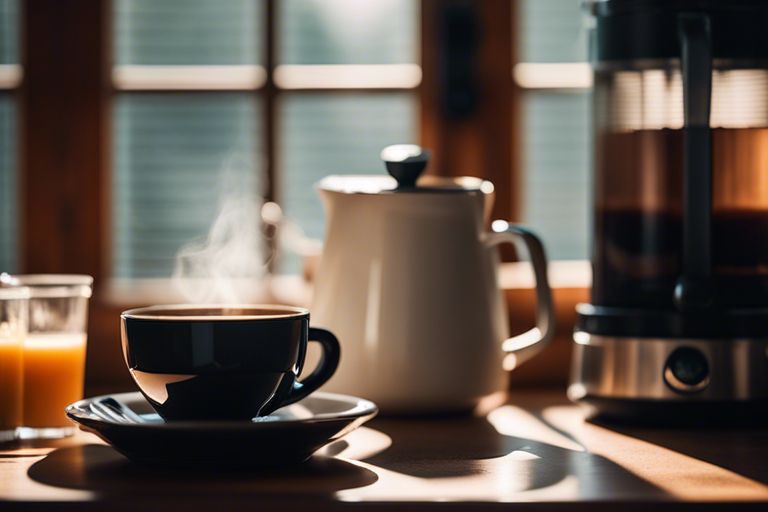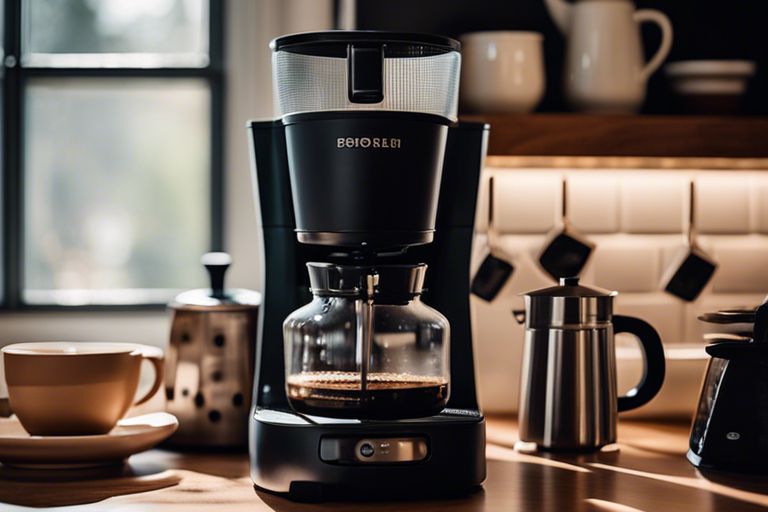Unlocking the alluring complexity of black coffee is a journey that probes deep into the heart of one of the world’s most beloved beverages. Known for its bold and intense flavor, black coffee is a staple in many cultures, cherished for its simplicity yet unmatched depth. As coffee enthusiasts commence on this exploration, they uncover a world of tasting notes and nuances that captivate the senses and elevate the coffee-drinking experience to new heights.
From the earthy undertones to the bright acidity, each sip of black coffee offers a symphony of flavors that dance across the palate. The brewing method, bean origin, and roast level all play a significant role in shaping the final taste profile of this iconic drink. By understanding the intricacies of these elements, coffee lovers can unlock a deeper appreciation for the art of black coffee and savor its diverse spectrum of flavors.
Whether enjoyed as a morning ritual or a mid-day pick-me-up, black coffee continues to fascinate and enthrall those who seek to unravel its mystique. With each cup, a new discovery awaits, inviting coffee connoisseurs to commence on a flavorful journey that transcends the ordinary and embraces the extraordinary.
Key Takeaways:
- Variety of Beans: The diverse range of black coffee flavors comes from the type of beans used, such as Arabica, Robusta, or specialty beans like Geisha, each offering a unique taste profile.
- Roasting Levels: The degree of roasting affects the flavor of black coffee; lighter roasts have a more acidic and floral taste, while darker roasts are richer and more bittersweet.
- Brewing Methods: The brewing technique impacts the flavor profile – whether it’s a pour-over, French press, Aeropress, or espresso machine, each method extracts different levels of oils, acids, and bitterness.
- Origin Matters: The region where the coffee is grown influences the flavor; factors like altitude, climate, soil, and processing methods all play a role in defining the taste of black coffee.
- Flavor Notes: Regularly tasting and noting the flavors – such as fruity, nutty, chocolatey, floral, or spicy undertones – helps in appreciating the complexity and depth of flavors in black coffee.

The History and Origins of Black Coffee
Some of the oldest and most captivating tales in the world of coffee date back to ancient Ethiopia, where the legend of Kaldi and his dancing goats is said to have marked the discovery of coffee. According to the story, Kaldi, a goatherd, noticed his goats behaving unusually energetic after consuming red berries from a certain shrub. Curiosity piqued, he tried the berries himself and experienced a newfound alertness. This discovery would eventually lead to the brewing of the first cup of coffee.
The Ethiopian Legend of Kaldi and His Dancing Goats
Any coffee enthusiast would find themselves intrigued by the lore surrounding Kaldi and his dancing goats. The tale not only adds a touch of whimsy to the origins of coffee but also underscores the close relationship between humans and this beloved beverage. It is stories like these that highlight the mystical allure of coffee and its journey through history.
Spreading the Beans: Global Migration of Coffee
Dancing through the annals of time, coffee made its way from Ethiopia to the Arabian Peninsula, where it was cultivated and traded by the Yemenis. From there, coffee seeds were smuggled and transported to various regions globally, eventually reaching Europe, Asia, and the Americas. This global migration of coffee sparked a revolution in societal gatherings, leading to the birth of coffeehouses and the widespread consumption of black coffee.
Beans have played a pivotal role in shaping cultures and economies around the world. The spread of coffee beans contributed to the establishment of trade routes, the rise of coffee empires, and the development of unique brewing methods that catered to diverse palates. Today, coffee continues to be a symbol of connection and conversation, transcending geographical boundaries.
The Birth and Evolution of Roasting Techniques
With time, the art of roasting coffee beans evolved, transforming the flavor profile of black coffee. Initially, coffee beans were roasted in shallow pans over open fires, resulting in a strong, smoky brew. As techniques advanced, dedicated roasting tools and methods were developed, allowing for more precise control over the roasting process and the creation of a spectrum of flavors and aromas.
Goats have historically played a unique role in the journey of coffee, from the playful antics of Kaldi’s dancing goats to the meticulous selection of beans by animal-assisted coffee farms. The connection between goats and coffee serves as a reminder of the intricate relationship between nature, sustainability, and the production of high-quality beans.
With every sip of black coffee, we are not just tasting a beverage but also the rich tapestry of history and innovation woven into each cup. Understanding the history and origins of coffee allows us to appreciate the complex flavors and aromas that have been perfected over centuries, making each brewing experience a journey back in time.
Understanding Black Coffee
What is Black Coffee?
Black coffee is a beloved beverage known for its bold and intense flavor. It is made by brewing coffee beans without any additional ingredients like milk or sugar. This black elixir is a pure form of coffee, allowing enthusiasts to savor the intricate flavors and aromas inherent in the beans.
When hot water comes in contact with coffee grounds during the brewing process, it extracts the rich oils and compounds that give black coffee its distinct taste. The result is a beverage that is robust, bitter, and aromatic, appealing to those who appreciate the natural essence of coffee.
Black coffee can vary in flavor profiles depending on the type of beans used, the brewing method, and the roast level. From fruity and floral notes to earthy and chocolatey undertones, black coffee offers a sensory journey for those willing to explore its nuances.
The Importance of the Bean
What sets black coffee apart is the quality and origin of the beans used. Coffee beans are at the heart of every cup, influencing the taste, aroma, and overall experience of the beverage. The geography, altitude, soil composition, and processing methods all play a crucial role in shaping the flavor profile of the coffee.
Arabica and Robusta are the two most common types of coffee beans used to make black coffee, each bringing its own unique characteristics to the brew. Arabica beans are prized for their complex flavors and acidity, while Robusta beans offer a strong, bitter taste and higher caffeine content.
Understanding the importance of the bean allows coffee enthusiasts to appreciate the nuances of different coffee varieties and make informed choices when selecting their brew. By exploring the origin and characteristics of the beans, one can unlock a world of flavors and commence on a journey of discovery through black coffee.
The Art of Brewing Black Coffee
All coffee lovers know that a great cup of black coffee starts with the brewing process. One of the critical factors that can make or break your coffee experience is the grind size of your coffee beans. Grinding your coffee beans to the right consistency is important for extracting the flavors properly and achieving the perfect balance of acidity and bitterness in your cup. Different brewing methods require different grind sizes to optimize the extraction process. For example, a finer grind is suitable for espresso machines, while a coarser grind is more suitable for French press brewing.
Grinding for Greatness: The Impact of Grind Size
With respect to brewing black coffee, the grind size plays a crucial role in determining the overall flavor profile of your cup. A finer grind will result in a more intense and flavorful brew, while a coarser grind will produce a lighter and more delicate flavor. Adjusting the grind size to suit your brewing method and personal preference is key to unlocking the rich flavors of your coffee beans. Investing in a quality burr grinder and experimenting with different grind sizes will help you find the perfect balance for your taste.
Methods and Madness: An Overview of Brewing Techniques
The world of coffee brewing is vast and diverse, with a variety of methods available to suit every coffee enthusiast’s preferences. From pour-over to French press, each brewing technique offers a unique way to extract the flavors from your coffee beans. Understanding the principles behind each method and mastering the brewing process is important for achieving a consistently delicious cup of black coffee. Experimenting with different brewing techniques will not only enhance your coffee knowledge but also broaden your palate to appreciate the nuances of flavor in each cup.
Whether you prefer the simplicity of a pour-over or the boldness of a cold brew, mastering the art of brewing black coffee is a rewarding journey that allows you to explore the depth and complexity of this beloved beverage. With the right tools, techniques, and a little bit of patience, you can unlock the mystique of black coffee and savor every sip of its rich flavor profile.
The Flavor Profile of Black Coffee
The Chemistry of Taste
Despite its simple appearance, black coffee offers a complex flavor profile that is a result of the intricate chemistry involved in the brewing process. One key contributor to the flavor of black coffee is the extraction of compounds such as acids, sugars, and oils from the coffee grounds during brewing. These compounds interact with each other to create the unique taste profile that coffee lovers appreciate.
Another important aspect of the chemistry of taste in black coffee is the role of caffeine in influencing the overall flavor. One of the most well-known compounds in coffee, caffeine adds a bitter note to the flavor profile. However, when balanced with the other compounds present, it contributes to the overall complexity and depth of the coffee’s taste.
Additionally, the brewing method and water quality play a significant role in shaping the flavor of black coffee. The temperature at which the water is brewed, the grind size of the coffee beans, and the brewing time all affect the extraction of compounds and ultimately impact the taste of the final brew.
Identifying and Describing Flavors
Tastes and aromas in black coffee can encompass a wide range of flavors, from fruity and floral notes to earthy and nutty undertones. Tastes such as acidity, bitterness, sweetness, and body all contribute to the overall flavor experience. An experienced coffee taster can identify these flavors and nuances to appreciate the complexity of a black coffee’s taste profile.
The acidity in black coffee is not the same as the sourness in spoiled milk; rather, it refers to the bright, tangy notes that add liveliness to the brew. Bitterness, on the other hand, is a common taste in coffee that can range from mild to strong, depending on various factors such as bean origin and roast level.
The body of black coffee refers to its mouthfeel and texture, which can range from light and watery to heavy and velvety. Describing these flavors accurately requires honed sensory skills and a deep understanding of coffee’s complex flavor profile.
The Influence of Roasting
Not only does the origin of coffee beans play a crucial role in the flavor profile of black coffee, but the roasting process also significantly impacts the final taste. Roasting transforms raw green coffee beans into the aromatic, flavorful beans we brew into our favorite morning beverage. The duration and temperature of the roasting process dictate the degree of transformation the beans undergo, influencing the taste, aroma, and body of the coffee.
Degrees of Transformation: The Roasting Spectrum
Influence begins the moment green coffee beans hit the roaster, with high heat triggering a series of chemical reactions that create the complex flavors we associate with coffee. The roasting spectrum ranges from light to dark, with each level influencing the taste profile differently. Light roasts preserve more of the bean’s original characteristics, boasting bright acidity and floral or fruity notes. Medium roasts strike a balance between the bean’s inherent flavors and the roasting process, offering a well-rounded cup with complexity. Dark roasts, on the other hand, result in rich, bold flavors with smoky, caramelized notes but often diminish the bean’s origin characteristics.
Unlocking Flavors: How Roast Profiles Affect Taste
Unlocking the full potential of coffee beans hinges on understanding how roast profiles affect the taste of the final brew. Each roast profile extracts different compounds from the beans, leading to distinct flavor profiles. Lighter roasts typically have bright acidity and floral or fruity notes, while medium roasts bring out balanced flavors with hints of caramel and chocolate. Dark roasts offer bold, smoky flavors with a rich body, but can sometimes mask the nuanced flavors of the beans.
Plus, when experimenting with different roasting levels, consider the brewing method to optimize the flavors extracted from the beans. Light roasts often shine in pour-over or drip coffee makers, showcasing their delicate flavors. Medium roasts work well with various brewing methods, offering versatility in taste. Dark roasts excel in espresso or French press preparations, where their intense flavors can stand out.
The Importance of Water
Despite questions about the coffee beans, the brewing method, and the equipment used, one crucial element often overlooked in the quest for a perfect cup of black coffee is the water itself. Water makes up a significant portion of the final beverage, so its quality and properties can greatly impact the flavor profile.
Quality Matters: The Role of Water in Brewing
Quality water is the unsung hero of a delicious cup of black coffee. The minerals present in water can interact with the coffee grounds during brewing, affecting the extraction process and ultimately, the taste of the coffee. Water that is too hard (high mineral content) can lead to over-extraction, resulting in a bitter brew, while water that is too soft (low mineral content) may under-extract, producing a flat and dull cup. It is important to use clean, filtered water with balanced mineral content to achieve the optimal flavor in your black coffee.
The Perfect Ratio and Temperature
An
| Ratio |
Temperature |
| The ideal coffee-to-water ratio is typically around 1:16, but this can be adjusted according to personal preference. Experiment with different ratios to find the perfect balance of strength and flavor. |
The water temperature plays a crucial role in coffee extraction. The optimal range is between 195-205°F (90-96°C). Water that is too hot can scorch the coffee, while water that is too cold will not extract enough flavor. |
The perfect ratio of coffee to water and the optimal brewing temperature are key factors in achieving a well-balanced and flavorful cup of black coffee. Experimenting with different ratios and temperatures can help you discover your preferred taste profile. Be mindful of, small adjustments can make a big difference in the final outcome of your brew.
The quality of water used for brewing and the precision in maintaining the correct ratio and temperature are crucial elements in unlocking the rich flavor profile of black coffee. By paying attention to these details and making minor adjustments as needed, you can elevate your coffee experience and savor the nuanced flavors present in a simple cup of black coffee.
The Health Benefits of Black Coffee
After water, coffee is one of the most consumed beverages around the world. It is loved for its bold flavor and the instant kick it provides. Beyond its taste and aroma, black coffee offers a range of health benefits that can support overall well-being.
Boosting Metabolism: The Energizing Effect
Boosting metabolism is one of the key benefits of black coffee. The caffeine present in coffee acts as a stimulant, increasing the metabolic rate and promoting the burning of fat stored in the body. By enhancing metabolism, black coffee can aid in weight management and improve energy levels. Consuming a cup of black coffee before a workout can also enhance performance by providing a natural boost.
Antioxidants and Longevity: Exploring the Nutritional Aspects
Nutritional benefits of black coffee stem from its rich antioxidant content. Antioxidants are compounds that help neutralize harmful free radicals in the body, protecting cells from damage and reducing the risk of chronic diseases. Black coffee is a potent source of antioxidants, such as chlorogenic acid and polyphenols, which have anti-inflammatory and anti-aging properties. Regular consumption of black coffee can contribute to overall health and promote longevity.
Coffee contains a variety of antioxidants that play a crucial role in reducing inflammation and preventing oxidative stress. Studies have shown that the antioxidants in coffee may help lower the risk of conditions like heart disease, diabetes, and certain types of cancer. Additionally, the presence of these beneficial compounds in coffee can support a healthy immune system and protect against age-related damage.
Pairing and Enhancing the Black Coffee Experience
Once again, delving into the world of black coffee is an adventure for the senses. To truly appreciate the depth and complexity of this beverage, it’s necessary to understand how to bring out its full potential. If you want to unlock the rich aroma and flavor of coffee beans, check out Unlock the Rich Aroma and Flavor of Coffee Beans for valuable insights.
The Art of Pairing Black Coffee With Food
Pairing black coffee with food is an art that can elevate both the drink and the dish. The key is to balance the flavors, aiming for complementary or contrasting notes that enhance the overall experience. For example, the boldness of a dark roast can pair excellently with rich chocolate desserts, creating a harmonious blend of bitter and sweet flavors. Experiment with different pairings to discover your favorite combinations.
Enhancing Flavor Without Sugar or Cream
Enhancing the flavor of black coffee without the use of sugar or cream requires an understanding of the beverage’s natural characteristics. Consider exploring various brewing methods such as pour-over, French press, or espresso to highlight different flavor profiles. Pay attention to the coffee’s origin, roast level, and grind size to make the most of its unique taste. Embrace the purity of black coffee and savor the intricate notes that unfold with each sip.
With a mindful approach to brewing and tasting black coffee, you can enhance its flavor without relying on additives. Experiment with different brewing parameters, such as water temperature and brew time, to customize your coffee experience. By appreciating the nuances of black coffee, you can develop a deeper appreciation for this versatile beverage.
Beyond the Cup: Sustainable and Ethical Coffee Practices
Understanding Fair Trade and Organic Coffee
For coffee lovers seeking a deeper connection with their brew, understanding the importance of fair trade and organic practices is paramount. Fair trade coffee ensures that farmers receive a fair price for their beans, allowing them to invest in their communities and improve their livelihoods. This system also promotes sustainable farming practices and ensures that labor standards are upheld. On the other hand, organic coffee is grown without the use of synthetic pesticides or fertilizers, promoting environmental conservation and the health of both farmers and consumers.
Choosing fair trade and organic coffee not only supports ethical practices but also results in a superior cup of java, free from harmful chemicals and produced with care for both the environment and the people involved in its cultivation. By opting for these types of coffee, consumers can directly contribute to a more sustainable and equitable coffee industry.
When purchasing fair trade and organic coffee, consumers can be confident that their choice aligns with their values of supporting ethical practices and sustainable agriculture. By making informed decisions, coffee enthusiasts can positively impact the lives of farmers and their communities, while also enjoying a delicious and responsibly sourced beverage.
The Impact of Consumer Choices on Coffee Communities
Communities dependent on coffee production are profoundly influenced by consumer choices. When consumers opt for fair trade and organic coffee, they empower coffee-growing communities by ensuring fair wages, safe working conditions, and environmental sustainability. These practices enable farmers to invest in their businesses, provide for their families, and improve their quality of life. By supporting ethical coffee production, consumers play a crucial role in uplifting these communities.
Understanding the impact of consumer choices on coffee communities underscores the importance of mindful consumption. By prioritizing ethical and sustainable coffee practices, consumers can foster positive change in the coffee industry and contribute to the well-being of the individuals and families who rely on coffee for their livelihoods.
Adding a note about the significance of consumer choices on coffee communities serves as a reminder of the power individuals hold in shaping the future of the coffee industry. By making conscious decisions and supporting ethical practices, consumers can create a ripple effect that benefits not only the quality of coffee but also the lives of those who cultivate it.
Home Brewing Mastery: Tips and Tricks
All coffee enthusiasts know that the secret to a perfect cup lies in mastering the art of home brewing. While it may seem intimidating at first, with the right equipment and techniques, you can elevate your coffee game to new heights. Whether you prefer a pour-over, french press, or drip coffee maker, there are certain tips and tricks that can help you unlock the full potential of your beans.
Selecting the Right Equipment
Mastery of home brewing starts with selecting the right equipment. Investing in a high-quality coffee grinder is important to ensure a consistent grind size, which directly impacts the extraction process. Pair it with a precision scale to measure the coffee grounds accurately and achieve the perfect coffee-to-water ratio. Additionally, choosing the right brewing method that suits your taste preferences will set the foundation for a delicious cup of black coffee.
Mastering the Variables: Time, Temperature, and Turbulence
When considering home brewing, mastering the variables of time, temperature, and turbulence is crucial for consistent results. Controlling the brewing time allows you to fine-tune the strength of your coffee, while monitoring the water temperature ensures proper extraction of flavors. Managing the turbulence or agitation during brewing can enhance the coffee’s body and clarity. Experimenting with these variables will help you tailor your brewing process to achieve the perfect cup of brewed coffee.
Knowing how to manipulate these factors will empower you to create a truly customized coffee experience from the comfort of your home. It’s the attention to detail in every step of the brewing process that separates a good cup of coffee from an exceptional one. By understanding the impact of time, temperature, and turbulence, you can unlock a world of flavors and aromas in your black coffee.

Black Coffee in Popular Culture
Coffee and Creativity: The Drink of the Thinkers and Artists
For centuries, black coffee has been intertwined with creativity in popular culture. From writers to painters, thinkers to musicians, black coffee has been the go-to elixir for those seeking inspiration. This rich, bold beverage is often seen as the fuel for creative minds, sparking new ideas and pushing boundaries. The intense flavor of black coffee perfectly complements the deep thinking and artistic processes, making it a staple in the lives of many creative individuals.
Popular figures like Ernest Hemingway, Joan Didion, and David Bowie were known to be avid black coffee drinkers, citing its ability to enhance concentration and stimulate their creative juices. The ritual of brewing a fresh cup of black coffee can be a meditative experience, providing a moment of calm in the chaos of creative endeavors. The bitter taste of black coffee is often seen as a reflection of the struggles and complexities inherent in the creative process, adding to its allure among artists and thinkers.
Black coffee’s association with creativity in popular culture extends beyond individual artists to collaborative spaces like cafes and coffeehouses. These establishments have long served as meeting points for creatives to gather, exchange ideas, and find inspiration in each other’s company. The aroma of freshly brewed black coffee wafting through the air creates an atmosphere conducive to deep conversations, innovative thinking, and artistic collaborations. The café scene has become a hotspot for creative individuals seeking a sense of community and shared experiences.
The Café Scene: A Hotspot of Societal Evolution
Any exploration of black coffee in popular culture would be incomplete without delving into the significance of the café scene. Coffeehouses have historically been important venues for social and intellectual discourse, shaping movements and revolutions. The exchange of ideas facilitated by the presence of black coffee in these spaces has often been a catalyst for societal evolution, challenging norms and fostering creativity.
For instance, during the Age of Enlightenment, European coffeehouses became hubs of philosophical debates, political discussions, and cultural exchange. The egalitarian nature of these spaces, where individuals from all walks of life could come together over a cup of black coffee, played a crucial role in shaping the intellectual landscape of the time. The café scene continues to be a reflection of society, evolving with the times to accommodate new forms of expression and collaboration.
The Future of Black Coffee
Many coffee enthusiasts and industry experts are eager to glimpse into the future of black coffee, anticipating the exciting developments that lie ahead. As technology continues to evolve, we can expect to see significant innovations in both coffee production and brewing techniques, leading to even richer and more diverse flavor profiles for black coffee lovers to savor.
Innovations in Coffee Production and Brewing
Coffee producers worldwide are investing in cutting-edge technologies and sustainable practices to improve the quality and consistency of their beans. From state-of-the-art processing methods to precision roasting techniques, the future of coffee production holds great promise for enhancing the taste and aroma of black coffee. Additionally, advancements in brewing equipment, such as smart coffee makers and specialized extraction tools, are revolutionizing the way coffee is brewed and enjoyed.
These innovations are not only elevating the overall coffee experience but also creating new opportunities for coffee enthusiasts to explore a wider range of flavors and brewing methods. With a growing emphasis on quality and sustainability, the future of black coffee is bright, offering endless possibilities for discovery and enjoyment.
As technology continues to shape the coffee industry, the potential for exciting new flavor profiles and brewing techniques in black coffee is vast. By embracing innovation and sustainability, coffee producers and enthusiasts alike are paving the way for a more vibrant and dynamic coffee culture in the years to come.
Predicting Trends in Consumer Preferences
Black coffee has been enjoying a resurgence in popularity in recent years, with more consumers embracing its bold flavors and health benefits. As we look to the future, it is crucial to predict and adapt to the changing preferences of coffee drinkers to stay relevant in the market. Factors such as flavor diversity, ethical sourcing, and convenience will continue to play a significant role in shaping consumer preferences.
Connoisseur Conversations: Interviews with Industry Experts
Not all heroes wear capes, some wield portafilters and steam wands. In the world of coffee, baristas are the unsung champions who transform humble beans into liquid gold. Through meticulous calibration of grind size, water temperature, and extraction time, these coffee maestros craft the perfect cup that tantalizes the taste buds and ignites the senses. Let’s look into espresso machines and latte art to uncover the secrets of the barista’s perspective.
The Barista’s Perspective: Crafting the Perfect Cup
Any coffee aficionado knows that brewing a flawless cup requires more than just pressing a button on an automatic machine. It demands finesse, expertise, and a deep understanding of the alchemy behind extraction. From sourcing the finest beans to frothing milk to velvety perfection, baristas pour their passion into each cup they create. Their keen sense of taste and aroma guides them in adjusting variables until they achieve that elusive balance that elevates a simple espresso shot to a transcendent experience.
Perspective: Baristas are the frontline warriors in the battle for exceptional coffee. Their ability to calibrate equipment, understand flavor profiles, and engage with customers sets the stage for a memorable cafe experience. Through their dedication and skill, they bring to life the nuances and complexities of different coffee origins, creating a sensory journey for coffee lovers to savor.
The Roaster’s Craft: Shaping the Flavor Profile
Any coffee journey begins long before the beans reach the grinder, in the hands of the master roaster. These guardians of flavor oversee the transformation of raw green beans into aromatic delights through the magical process of roasting. From light to dark roasts, each bean is carefully curated to bring out its unique characteristics, whether it’s fruity notes from Africa or chocolatey undertones from Central America.
To wrap up
With this in mind, it is evident that black coffee is not just a simple beverage but a complex and rich experience that can be explored and appreciated. By understanding the different flavor profiles present in black coffee, coffee enthusiasts can begin on a journey to discover the nuances and subtleties of each unique cup. From fruity and floral notes to earthy and nutty undertones, there is a wide range of flavors waiting to be unlocked and savored.
Exploring the rich flavor profile of black coffee allows coffee lovers to truly appreciate the intricacies of their favorite drink. By experimenting with different brewing methods, coffee origins, and roast levels, individuals can tailor their coffee-drinking experience to suit their preferences and palate. Whether enjoying a bold and robust espresso or a smooth and delicate pour-over, black coffee offers a versatile range of tastes to suit every discerning coffee drinker.
In the final analysis, unlocking the mystique of black coffee opens up a world of possibilities for those willing to probe deeper into the complexities of this beloved beverage. With a newfound appreciation for the diverse flavor profiles that black coffee has to offer, coffee connoisseurs can enhance their sensory experience with each cup. So, the next time you savor a freshly brewed black coffee, take a moment to reflect on the rich tapestry of flavors that have come together to create that perfect cup. Cheers to unraveling the mysteries of black coffee and enjoying the full spectrum of its flavor profile!
FAQ
Q: What is black coffee?
A: Black coffee is a coffee beverage made from brewed coffee without any additional ingredients like milk, sugar, or cream.
Q: How is black coffee different from other types of coffee?
A: Black coffee is distinct in its pure form, allowing the drinker to experience the true essence and flavor profile of the coffee bean without any distractions from added ingredients.
Q: What contributes to the rich flavor profile of black coffee?
A: The flavor profile of black coffee is influenced by various factors such as the type of coffee bean, the region it was grown in, the roasting process, and the brewing method.
Q: How can one unlock the mystique of black coffee?
A: To fully explore the rich flavor profile of black coffee, it is necessary to experiment with different coffee beans, brewing techniques, and grind sizes to find the perfect combination that suits your taste preferences.
Q: What are some tips for enhancing the experience of drinking black coffee?
A: To enhance the experience of drinking black coffee, consider pairing it with complementary foods, such as dark chocolate or nuts, and pay attention to the temperature of the coffee to fully appreciate its flavors.
The Ultimate Guide to Brewing the Perfect Cup of Black Coffee at Home
Health Benefits Unveiled – How Black Coffee Boosts Your Well-being
From Bean to Cup – The Fascinating Journey of Black Coffee Production
Caffeine Chronicles – Understanding the Power and Appeal of Black Coffee
Black Coffee: Origins, Nutrition, and Health Benefits







